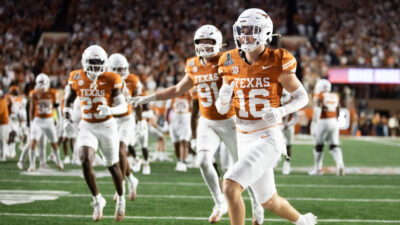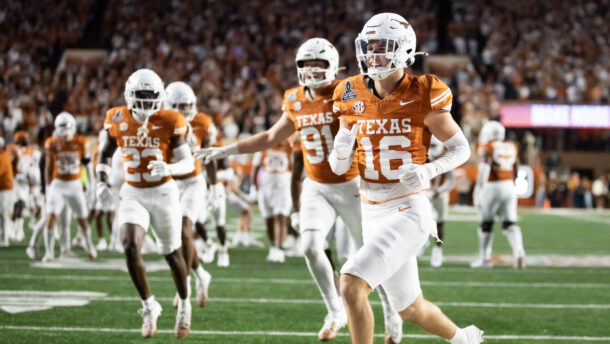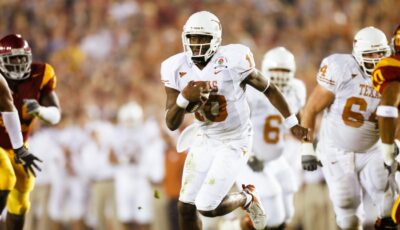
On the 5-year anniversary of Joe Burrow’s LSU commitment, what if he had picked Cincinnati?
On May 18, 2018, nobody could’ve predicted how many lives would change with a simple announcement. When the college football calendar was supposed to be at its least relevant time, one could argue that the most relevant personnel move of the past 5 years took place in the middle of a typical, mid-May day.
Former Ohio State quarterback Joe Burrow picked LSU instead of Cincinnati.
It was seen as a bit of a surprise that the Ohio native elected to leave his home state and sign up for a gauntlet SEC schedule, which had many speculating whether Ed Orgeron would get a Year 3. Entering Year 4 of college, Burrow wanted to play. He left Ohio State after deciding he wasn’t going to beat out Dwayne Haskins, who shined in relief for the injured JT Barrett at Michigan in 2017. That only happened because Burrow broke his hand. But even healthy after an impressive spring, he elected to take his talents elsewhere instead of risking the idea of being a backup as a redshirt junior.
The rest, of course, is history. A Heisman Trophy, a national championship, a No. 1 overall selection and a blossoming NFL career turned Burrow into one of the faces of American sports.
But the sliding doors? They’re aplenty.
What if Burrow had opted to join Luke Fickell at Cincinnati and he never played a down in the SEC? How would that have impacted LSU and the people who defined that magical 2019 season? What about other college football powers? Did Burrow impact them, too? Absolutely.
Let’s dig into that.
I don’t really think an Ohio State sliding door makes sense
Why? A few reasons. Haskins was going to win that job. Nothing Burrow could’ve done would’ve changed that. Today, we’re focusing on the post-spring decision. It isn’t realistic to pretend that Burrow could’ve stayed when a quarterback a year younger than him was the favorite to win the starting job. Even if Burrow had known that Haskins would be 1-and-done as Ohio State’s starter, waiting another year wasn’t in his plans.
Besides, the Buckeyes ended up replacing Haskins with Justin Fields. In consecutive years, they had 2 guys who finished No. 3 in the Heisman voting. Granted, Fields was a distant 3rd to Burrow’s runaway victory in 2019.
Still, though. Ohio State’s trajectory probably would’ve been extremely similar to what it was in 2018 and 2019. They had 1-loss seasons with superstar quarterbacks. Actually, 2018 Haskins was better than 2018 Burrow.
As much as some might knock Ohio State for ever letting Burrow leave and deliver arguably the best single season in college football history elsewhere, we shouldn’t pretend like the Buckeyes made some Sam Bowie-Michael Jordan goof.
Ed Orgeron doesn’t get a 2019 season without Burrow’s commitment
That’s your first obvious sliding door.
Orgeron had a short leash as Joe Alleva’s outside-the-box, we-missed-on-Tom-Herman hire. An LSU team that had yet to reach a New Year’s 6 bowl game in the Playoff era was desperate. Specifically, Orgeron was desperate. Of little concern to him was quarterback depth. He determined that he didn’t have a quarterback who could take LSU to the places he wanted to go.
Redshirt freshman Myles Brennan was still very much in the “he needs to add more weight” phase of his career, Lowell Narcisse had plenty of size but not enough experience as a fellow redshirt freshman and Justin McMillan was entering Year 4 at LSU and clearly viewed himself as the presumed starter as the elder statesman of the quarterback room:
Love this game too much to to be toyed with. #longsleeveszn pic.twitter.com/mrOxXlaFXm
— JUSTIN MCMILLAN (@HONEYSLOTH_13) May 9, 2018
For what it’s worth, that tweet was as LSU was hosting Burrow on his official visit, wherein large amounts of crawfish were famously consumed. Also, McMillan was no slouch. He went on to become a solid quarterback at Tulane. But would McMillan have led LSU to a New Year’s 6 bowl game in 2018? Nope.
Remember, Burrow wasn’t the 2019 version of himself, but he was still pretty darn clutch to lead LSU to a 9-3 regular season against that grueling schedule. It might be easy to assume that all LSU needed was a game-manager at QB during that 2018 season, but we can’t forget that Burrow still had moments on the road at Auburn and A&M wherein we saw that superstar potential. LSU needed that to avoid having 3 losses by the end of October.
If Orgeron started off 6-3 with a blowout loss to Alabama — something that even Burrow couldn’t avoid in Year 1 — I believe he would’ve been fired. He would’ve been an inexpensive coach to part ways with pre-2019 raise, and a desperate LSU would’ve taken another crack at finding its next long-term coach.
The problem with that would’ve been, well, this …
So what did the post-2018 coaching cycle look like? Meh.
Let’s not forget that Scott Woodward was not in Baton Rouge yet. This post-2018 search would’ve had an Alleva scope, not a Woodward scope. In other words, it probably wasn’t realistic to think that Alleva was in position to poach someone like James Franklin after 5 years at Penn State, and even eventual-LSU coach Brian Kelly was still coming off his first Playoff berth at Notre Dame. The writing on the wall wasn’t there yet like it was in 2021.
We can’t ever rule out Mike Gundy and his potential interest at LSU, though given the fact that he’s still in Stillwater, it’s hard to assume that Alleva would’ve been the AD to get him to leave.
Here are a few of the coaches who were on the move after the 2018 season:
- Scott Satterfield
- Dana Holgorsen
- Mel Tucker
- Manny Diaz
Meh. The splashiest hire of the cycle was, ironically enough, Les Miles at Kansas.
It’s possible that Alleva could’ve done a total 180 and gone for a big swing with booster momentum, but at the same time, we didn’t have any evidence that he could land the big fish. His indecisiveness with Miles’ firing was criticized and the well-documented shortcomings with the Tom Herman move led us to believe that any sort of Orgeron successor after 2018 would’ve been a bit more underwhelming.
Could someone like Dave Doeren or Kevin Steele have been a target? Perhaps.
Who knows? Maybe the splashy, risk-it-all hire would’ve been a post-Louisville version of Bobby Petrino. Is it possible that Alleva, who clearly enjoyed going a bit more rogue, would have been so desperate to find his offensive-minded head coach and quarterback guru, that he resorted to Petrino? Maybe, though the timing of that wouldn’t have been great because Petrino was fired at Louisville after the 2018 season.
It’s probably unlikely, but it’s sure as heck entertaining to think of Petrino as Orgeron’s successor.
We have to consider the likely possibility that even in the pre-transfer portal era, many of those 2019 LSU stars would’ve left
We spend so much time talking about how that offense took off in 2019, and understandably so. It was historically dominant against elite competition in ways that we might not see again. Burrow and the scheme change with Joe Brady triggered all of that. If Orgeron had been fired, that 2019 group inevitably would have lost some future stars, even in the pre-portal era.
Ja’Marr Chase, Justin Jefferson and Clyde Edwards-Helaire would’ve all had options, though I suppose you could argue that an offensive-minded Orgeron successor could’ve kept them. The defense, though, would’ve potentially been gutted.
In Orgeron’s post-2019 title class of 2020, 16 of the 22 signees eventually transferred or were separated from the team. A good chunk of that was related to Orgeron’s post-2021 departure. We can’t apply that same logic to LSU post-2018 because immediate eligibility was only available to undergrads through the waiver process, but still. Think about guys like Grant Delpit, Patrick Queen and K’Lavon Chaisson. Could they have bounced?
And what about Derek Stingley Jr.? Stingley committed to LSU in the summer of 2018, but he would’ve signed weeks after a potential Orgeron firing. He could’ve gone anywhere and played as a true freshman, so his loyalty to LSU could’ve very well depended on Orgeron’s successor.
What if … Dave Aranda had been that guy? It’s possible, especially considering how respected he was (and is) in the coaching world. Looking back, that sure would’ve been much better than a potential hire of Steele or Doeren.
But remember, Alleva did the in-house promotion thing and it would’ve failed with Orgeron. Would he really get full support to do that again? Or would he be forced to make an outside hire on the offensive side of the ball — where LSU was desperate to get signs of life — in hopes that hire could retain Aranda as DC? The latter would’ve been ideal, but I question the assumption that Aranda would’ve stuck around for a third different regime.
My guess? Aranda would have followed a whole lot of that talent out the door before 2019.
Who benefits the most from that 2019 LSU team not being historic? Alabama and Clemson
No question.
Peak-Burrow and maybe peak-Trevor Lawrence were the only quarterbacks having a day like that in Tuscaloosa against that Alabama squad. Anything short of Burrow wasn’t ending LSU’s losing streak to the Tide, which was approaching 8 years.
While I can’t say for certain what the quarterback situation would’ve looked like with Orgeron’s post-2018 successor, I cannot imagine them being good enough to beat a Tua Tagovailoa-led Alabama team. Speaking of Tagovailoa, he suffered the hip injury against MSU, which was after the LSU game. If Alabama had faced a Burrow-less LSU, it would’ve gone into the 2019 Iron Bowl undefeated, but without Tagovailoa.
So … would Mac Jones have been the 2019 version of Cardale Jones? That, I believe, was absolutely on the table. Even if Bama still had lost the Iron Bowl, it would’ve played for an SEC Championship against that Georgia team. Could Jones have led the Tide to a victory against the Dawgs? History says backup quarterbacks always seem to work out well for Alabama against Georgia in Atlanta.
At the very least, it’s a thrilling SEC Championship where the winner would’ve been a considerable favorite to win the Playoff semifinal and face Clemson in the national championship. Perhaps we would’ve gotten Alabama-Clemson, Part 5. My money would’ve been on Alabama to get revenge against Clemson, though I suppose that’s by no means a given. That Clemson team did jump out to an early lead against LSU, and with the level that Lawrence was playing at in 2019, the Tigers could’ve picked up where they left off against Alabama following the title game blowout the previous season.
If Alabama had won a title with Jones, would the Tide have repeated and still won in 2020? That’s a tougher question to answer because while Jones still would’ve been the quarterback, who knows? Maybe DeVonta Smith leaves for the NFL Draft after 2019 instead of staying his senior year and becoming the first 21st century receiver to win the Heisman Trophy. Shoot, maybe that could’ve led to Lawrence winning the Heisman in 2020.
That’s all possible. What we know to be true is that Burrow’s brilliance likely blocked the Tide’s path to sniffing consecutive titles … as well as Clemson.
Did Georgia actually need that 2019 LSU team to get to where it is today? Yes.
I’m a firm believer that the day LSU smoked Georgia in the 2019 SEC Championship was what helped set the wheels in motion for Kirby Smart. He had to change. His offense needed a shift. LSU showed us exactly why a scheme change could yield great results for a team that already had top-5 talent. Georgia, by virtue of watching its top-ranked defense get smashed, had to adapt.
Smart moved on from James Coley as his offensive coordinator and brought in Todd Monken, who was billed as a pro-style system guy who could incorporate some of the Air Raid and tempo concepts that were becoming more synonymous with the NFL. Monken, for my money, was the single most important assistant hire of the Playoff era. I do not believe UGA repeats if not for his brilliance.
Does UGA still win at least 1 title in 2021 or 2022? Maybe. But even in 2021, you saw that Georgia team rally against Alabama in the title game with a highly efficient passing game in the 4th quarter. The Dawgs weren’t predictable. Stetson Bennett IV was unstoppable late. He was confident in part because he got reps in that system in 2020, which was the silver lining of that season. Bennett needed Monken’s offense. Georgia needed Monken’s offense.
While everyone in college football might’ve sought their version of Brady after watching LSU tear the sport up in 2019, so few teams actually had the personnel and talent to shift into offensive overdrive. Georgia was one of those teams.
If Georgia faced Alabama in that 2019 SEC Championship, there are 2 scenarios I could’ve seen play out. Either Georgia would’ve won that game and a Playoff/title game-bound Smart wouldn’t have had any reason to change his offensive approach. Or, his team could’ve lost to Alabama and it would’ve been seen as “Kirby still can’t get over the Saban hump.” I’m not so sure that any type of loss to Alabama would’ve been seen as a reason for why Smart needed to change his offensive approach.
Losing the way UGA did to LSU — in front of a Georgia-heavy crowd that was defeated by halftime — could’ve absolutely led Georgia down the path to truly thinking and operating like the juggernaut we know it to be today.
That’s right. Give Burrow partial credit for beginning UGA’s run of dominance.
So what would Burrow have become if he’d gone to Cincinnati?
I always find myself defaulting to the somewhat boring answer to that question. In 2018-19 with a solid Cincinnati squad under Fickell, my guess is that Burrow would’ve been viewed similarly to an upperclassman version of Desmond Ridder. That is, an excellent college player who would’ve made a lot of noise at the Group of 5 level, but he still would’ve been more of a mid-round prospect.
The Bearcats would have unleashed Burrow’s legs like LSU was finally able to do late in the 2018 season, but there’s no way that offense could have yielded anything close to what we saw at LSU in 2019. Burrow would’ve been seen as 1 of the top 10 college quarterbacks in the country and been regarded as a potential Day 2 prospect without an immediate path to playing time in the NFL.
Burrow changed Ridder’s path, no doubt. Ridder would have held a clipboard instead of starting like he did in 2018-19. Maybe Cincinnati doesn’t become the first and only Group of 5 Playoff team during Ridder’s senior season in 2021, and perhaps the program isn’t poached by the Big 12. Then again, it’s no guarantee that Ridder’s reps in 2018-19 were the difference in those things happening.
The irony is that if Burrow had picked the Bearcats, the city that would be feeling that the most is in fact … Cincinnati. I’d even include Baton Rouge in that discussion. Why? The Bengals have their franchise quarterback. They have someone who could have one of the highest approval ratings of anyone on the planet. He has potential to be in the same conversation as LeBron James in terms of his impact on the state of Ohio.
Burrow is all of those things, and then some.
Perhaps picking Cincinnati as a transfer destination would’ve only been a detour on his path to NFL success. It’s possible that Burrow was always going to work his way into an opportunity at the professional level, and that he’d thrive once he got it.
But I’ll always be convinced that the legendary version of what he became had to include LSU. He had to figure out who he was as a player and learn how to distribute to elite weapons. Maybe he had to absorb a cheap shot against UCF to get to a place that he didn’t know he had. Brady’s arrival could’ve been at the root of why he made the game look so easy.
Burrow has since repeatedly said that he’ll always be indebted to LSU for taking a chance on him. Five years later, we can say with certainty that the feeling is mutual.
Connor O'Gara is the senior national columnist for Saturday Down South. He's a member of the Football Writers Association of America. After spending his entire life living in B1G country, he moved to the South in 2015.







